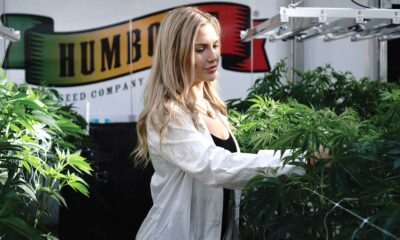
Culture
Speak Life: Damian Marley Confronts the Cannabis Industry’s New Demons
In an interview with Cannabis Now, Damian Marley reveals how he thinks the cannabis industry has changed over the years, how marijuana influences (and does not influence) his creative process, and his vision for what the legal cannabis industry can do for longtime supporters of the plant.
“Dem fight you fi years/And now the whole a dem buy shares,” Damian “Jr. Gong” Marley sings on the lead single “Medication” from his most recent album, warning of the new breed of capitalist thriving in the modern cannabis industry — the type who criminalized the plant for decades only to turn around and invest in the industry today. “Look how Babylon ‘sud-up’ eeh!” he cries.
It’s not exactly a secret that Marley, the four-time Grammy-winning reggae artist and youngest son of Bob Marley, enjoys cannabis. The plant has been woven into his song lyrics since his debut album “Mr. Marley” in 1996, and he says it’s always been a part of his daily ritual. This separates Marley from many of the other celebrities currently lending their names to the cannabis cause. Sure, Marley has turned the herb he calls a sacrament into a business venture — releasing a vape pen made from his Speak Life OG strain — but this isn’t some steely-eyed economic calculation. It’s something he’s always believed in wholeheartedly and unabashedly.
Marley is also one of the few celebrities who
We spoke with Jr. Gong on a recent afternoon over the phone from Miami, where he’s currently working on recording a new album and preparing to host the March 14 International Cannabis Business Conference after party in Barcelona. Marley revealed how he thinks the cannabis industry has changed over the years, how marijuana influences (and does not influence) his creative process, and what he thinks can be done to combat that ever-oppressive force of Babylon as it pervades the cannabis industry.
Cannabis Now: What is it like being a cannabis enthusiast in Miami? Florida has such a complicated system, with a handful of companies controlling the market and the back-and-forth about whether or not smokable flower is allowed for medical patients…
Damian Marley: My life hasn’t changed that much. I use herb daily, I always have. It feels good to know that they’re moving toward some kind of legalization here, but
You live in Florida, but you have had cannabis businesses in California and Colorado where it’s more liberal but increasingly corporate, and you have family ties to Jamaica where the plant has been legalized for medical use and the country is starting to import to the global market. Which sort of regulations have you seen work best?
That’s what we’re all trying to work out now and what everyone is trying to find out. I think a lot of the regulations in place now are a bit stringent. I’d love to see the people who have stood by this plant all their lives and make their lives from this plant, either through the black market or through legitimate means, we’d like to see those people have a chance to survive in it. Unfortunately, a lot of these people aren’t the best when it comes down to it at papers and contracts and documents and legislation and such forth, myself included, you know? And a lot of these permits come with a hefty price — it doesn’t seem like it’s very accessible to a poor man in a lot of places. So that’s something I’m concerned about when it comes down to the movement going forward. I want it structured in a way where the people who’ve really put their freedom on the line to grow illegally over their years will have room to be a part of this legal program.
You’ve partnered to purchase the prison in Coalinga and turn it into a grow facility. Have you been able to work with people there to give jobs to those people you say have stood by the plant?
Yes. I’m not exactly sure of the number of employees we have right now, but somewhere in the ballpark of 80. What is happening at the prison right now is that it’s a prison — a lot of renovations have had to be done over the last few years to get the technical specs. We’re only now coming to the completion of that renovation. We’re looking for this year to really pick up some momentum on the prison.

What’s the vision for the grow at the old prison?
We’re going to make some new products, including extractions, at the prison. We’re also going to do some greenhouse grows there. We’re getting our ideas together now that the facility is almost set to be working.
There’s a movement now towards outdoor cannabis because of the environmental benefits of growing under the sun. Where do you come down on the indoor versus outdoor debate?
Personally, I like indoor herb to smoke. I really like smoking indoor herb, and I don’t have a problem with indoor cannabis.
I know you have your own strain, but what weed do you usually like to smoke? Do you prefer flower or concentrates?
I’m still a fan of
Going back to the idea of getting people in involved in the industry who have stood by the plant since the beginning, in your song “Medication,” you talk about how the same people who criminalized cannabis are now the ones investing in it — and about how this is a symbol of Babylon. Is this something you think about when you’re planning your partnerships in the cannabis industry?
Well, look, when you’re an investor, you’re seeing a great opportunity, but you’re also seeing a personal economic benefit. I like to do this with some form of morals, where I’m not eliminating opportunities for people or cornering the market so that other people can’t be involved. That is always important to me. Just like I’m saying in the song “Medication,” there are a lot of people who participate in the cannabis industry who 10 years ago wouldn’t be caught near marijuana. They wouldn’t have wanted it to be a part of their reputation that they’re involved in herb.
So, I mean, you have to deal with what the realities are now. That’s why I’m trying to get involved myself and why I would encourage anyone to really educate themselves about what is going on, and if they can, get involved at this early stage.
We also cannot forget the medical benefits of cannabis, which have nothing to do with getting high and have everything to do with getting well — this is something we need to highlight. The herb is becoming normalized and the more research that has been done shows more and more progress. We can’t turn a blind eye to the medical benefits of this plant and its potential to help people get well.
When I go to cannabis conferences, I’m increasingly meeting more people interested in the profits around cannabis and less on the medical side. Are you feeling any changes in the cannabis industry over your years participating in it?
It’s not a feeling, it’s a reality. Look at Canada. Canada has cannabis on the stock exchange. It’s not that I feel cannabis is getting more profit-oriented, it’s the reality. It’s more corporate for sure.
What would be a shame in my opinion — what would really be disappointing to me — is if these huge agricultural corporations with so much muscle start muscling everyone else out. It’s a huge concern. There are people who have been feeding their families by growing cannabis for decades, and it’s been a risk for them. They could be locked up for it. But I can’t say that I don’t want to get involved because I’m not a corporate-type person. That’s the concern.
You’ve been making and producing music that involves cannabis for a long time. Are you working on any new musical projects?
I’ve been producing new music for the legendary reggae band Third World, which will be coming out in the next few months, and I’m starting my next album. I do have some releases on the horizon. I’ve been in the studio.
What’s inspiring this new work? What has the creative process been like?
At this time, I’m just getting the tools together. Getting sounds in my drum machine and doing the groundwork for us to go in and start creating. Creating music is about what the vibe is in the moment so I can’t pinpoint too well what is going to happen. Once we start doing it, the energy takes control of the project itself, you know?
How much does cannabis play a role in your creative process?
It plays a role in my day to day life. I smoke daily. It’s very seldom that you’ll see me in the studio and I’m not smoking. It’s a big part of my life overall, let alone just when I’m in the studio.
Are you seeing your role as a musician changing over the years? You’ve been working as a musician for decades now. Are your goals changing? Do you feel new responsibilities?
There’s a natural evolution, but I would say things have changed more than they have evolved. In the last few years, I’ve been doing a lot more production now outside of my own music. I’ve been producing other artists recently. There are younger artists who are looking up to me. I was the littlest brother, and now I’m one of the big brothers in the industry. Everything I do musically is based upon natural instinct, it’s based upon what I love doing. A part of what I love doing is helping young people and helping with young talents. It’s a wonderful thing for me.
I ask about what you’re seeing as your responsibilities now because a few years ago you spoke before the British Parliament to advocate for medical cannabis, and now the country is setting up its medical marijuana system. Do you see yourself advocating in front of the U.S. government ever? Or perhaps is your music your advocacy?
My music will always be what speaks the loudest. It reveals how I view situations. But I will go wherever duty calls. Wherever I am invited, wherever I am welcome, wherever I need to be, wherever Jah calls.
On March 14, duty has called Marley to Barcelona, where he will be performing at ICBC Barcelona’s after party.
TELL US, is cannabis a part of your daily ritual, too?
























